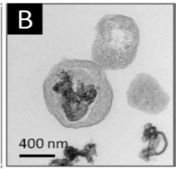Despite the decades of efforts spent on the development of targeted drug delivery systems, reducing systemic drug exposure and limiting off-target side effects are still primary challenges in the treatment of multiple diseases, including cancer. Cell-secreted exosomes and bio-vesicles have been shown to be involved in intercellular communication and activation of the immune system, during both normal as well as pathological processes. These vesicles have been shown to be able to efficiently transport genetic material, proteins, cellular components, and nanoparticles, between different cells, even at long distances. Medical researchers and pharmaceutical companies are therefore recognizing the potential of these vesicles, and their bio-mimetic versions, as the next generation drug delivery vectors.